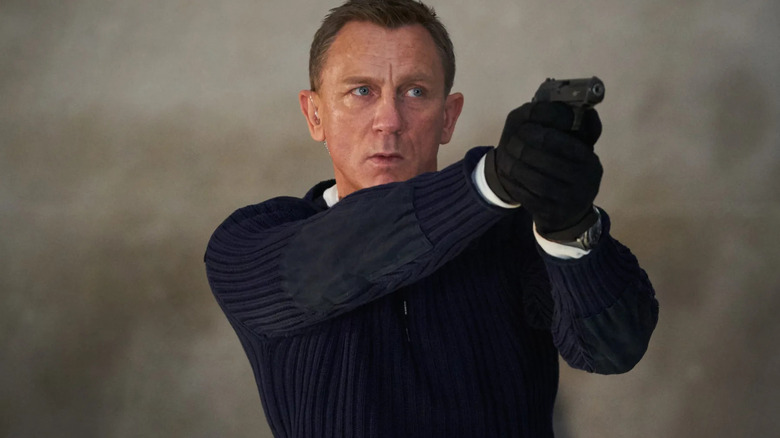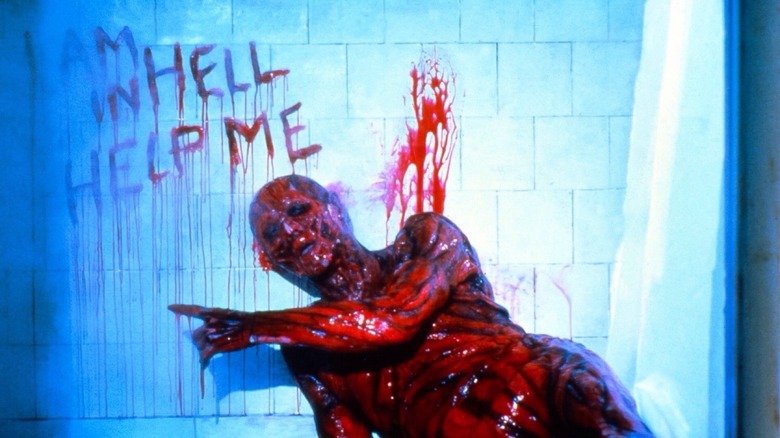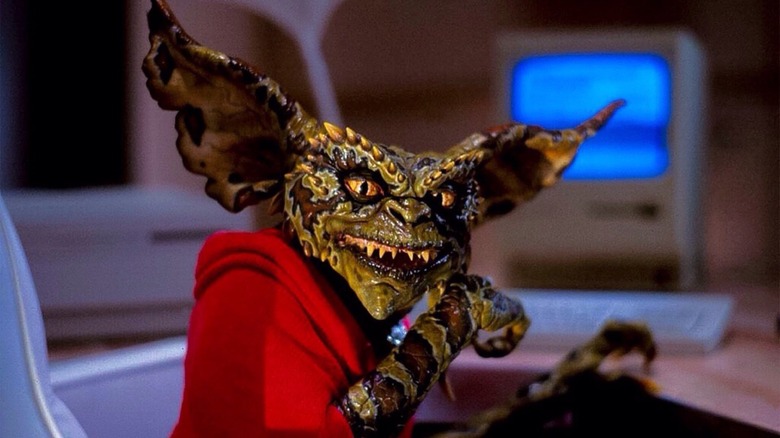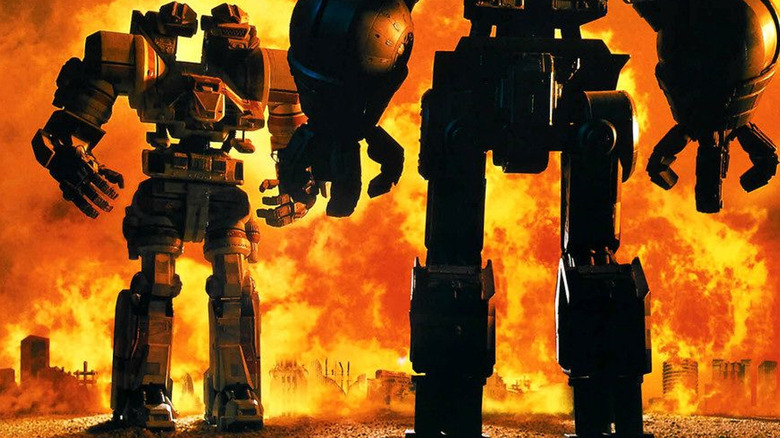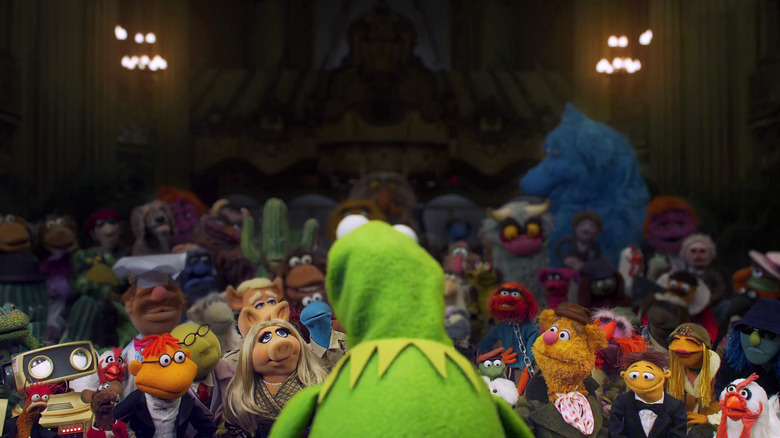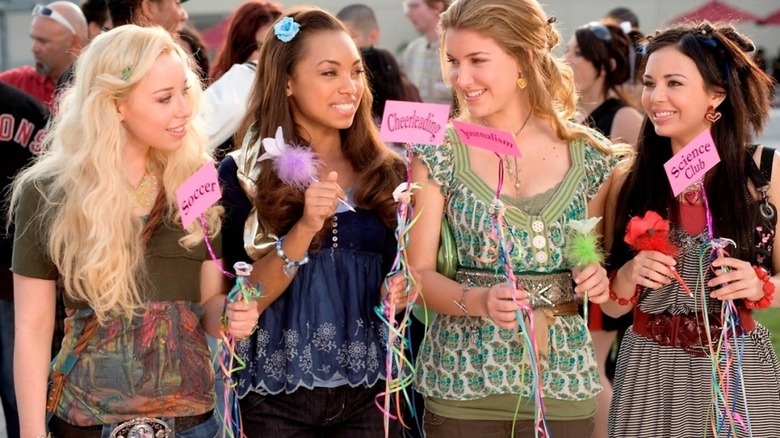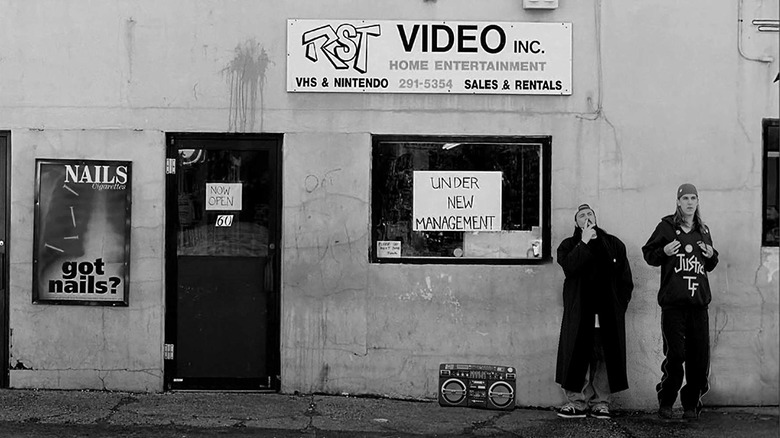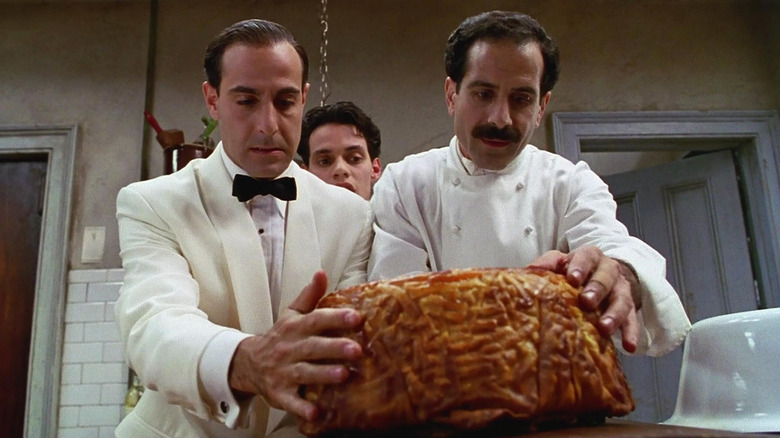Eight Movie Franchises That Would Make For Great, Not-At-All Dubious Reality Competition Shows
Variety recently announced that Prime Video is developing a TV show based on the James Bond movies. Called "007's Road to a Million," the series will be a globe-trotting, eight-part game show wherein competitors race around the world with the aid of Bond-inspired gadgets and allies. The show is being produced with the blessing of Barbara Broccoli, whose family has overseen the James Bond film franchise since the start. This announcement came in tandem with a massive $8.45 billion deal wherein Amazon purchased MGM, the studio that owns the James Bond franchise. The prize is £1 million.
The announcement of a Bondian game show is enough to inflame the imagination of any Bond fan, and even the most casual observer may suddenly fancy themselves a producer or puzzle designer. What possibilities. The competitors can infiltrate an opera. They have to sprinkle "poison" into a "bad guy's" drink. They must race in an Aston Martin down a twisty Swiss road. There will definitely be a skiing portion, a game played on a submarine, and a quest to secure a strip of incriminating microfilm. Also, competitors have to make the proper vodka martini. If you stir it, you're out.
And while one's imagination is already enflamed, one can start imagining all kinds of film franchises making for excellent gameshows. What better way to recreate your favorite film's sense of peril than by watching some poor schmuck re-enact a variant of its action scenes for a cash prize? Or, better yet, to compete for that cash prize yourself by occupying a beloved horror franchise or action series?
Here are some ideas.
Hellbound: Hellraiser II
Based on the events of Tony Randel's 1988 sequel "Hellbound: Hellraiser II," contestants receive a vision from a skinless dead friend or relative, enticing them to enter Hell to rescue them. The Hell in the mythos of the long-running "Hellraiser" series — now 10 films deep, with a remake on the way — is not the fire-and-brimstone realm popularly seen in Warner Bros. cartoons, but a surreal, stony labyrinth full of hedonistic S&M enthusiasts who want to either seduce your or rip you to shreds, mostly both. There are also transmogrification booths that can transform you from an ordinary human into a Cenobite. The entrance to Hell is opened by a mysterious puzzle box.
Competitors must solve a series of puzzles, traverse a blood-soaked labyrinth, and avoid the lurking Cenobites. For every puzzle they solve, they receive a cash prize and clue as to how to solve the next puzzle. It's a series of mountingly difficult escape rooms. If a competitor is caught, they are turned into a Cenobite and can then prevent future competitors from reaching their goal. At the center of the labyrinth is Leviathan, the Lord of Hell, an enormous floating diamond-shaped obelisk. Leviathan's level must, naturally, be a speed round where multiple puzzles must be solved at once while the competitor's hands are chained to the wall.
Given the twisted nature of "Hellraiser," this would be a perfect game show for Shudder.
Gremlins 2: The New Batch
Although the creatures from Joe Dante's 1984 film "Gremlins" did have a cameo in the execrable "Space Jam: A New Legacy," little has been seen of these critters since the 1990 film "Gremlins 2: The New Batch," easily one of the best films of that year. It's only now in 2022 that "Gremlins" is being resurrected in "Gremlins: Secrets of the Mogwai," debuting this June on HBO Max. Either Warner Bros. has shown restraint in not setting a stool down next to the Gremlins and milking them of every drop, or the executive realized that the films function as satire, and making a film or a show about them is to welcome chaos.
Chaos, luckily, is the perfect milieu for game shows, and traversing "Double Dare"-like physical challenges is certainly de rigueur. If Peacock can broadcast a TV series based on the 1981 arcade game "Frogger," then certainly HBO Max could host "Gremlins: Escape from Clamp Tower."
"Gremlins 2" takes place in, essentially Trump Tower — called Clamp Tower in the film — wherein a high-powered media mogul Daniel Clamp (an amalgam of Trump and Ted Turner) finds his high-tech building is being overrun with the title monsters. They take over the tower's TV station, its genetics lab, its elevators, its stock market, and its frozen yogurt stand. The game show will take place in a studio facsimile of Clamp Tower, and contestants would need to work their way from the top of the tower down to the bottom, all while confronting the Gremlins' chaos. One challenge might involve unblocking a door they have wedged shut, while another could perhaps involve correctly mixing "chemical" vials to throw in the faces of encroaching creatures. There would certainly be a spooky hallway full of the Spider Gremlin's webbing, requiring contestants to break free, as well as a performance competition wherein competitors would have to sing or dance to a panel of Gremlin judges who have film critic Leonard Maltin (playing himself) tied up.
Death Race 2000
Clearly Paul Bartel's 1975 cult classic "Death Race 2000" — now part of a six-film franchise — couldn't be accurately re-created as it would be less-than-ethical to actually commit acts of vehicular murder on camera ... but perhaps we could arrange a reasonable facsimile. "Death Race 2000" takes place in the far-flung future of A.D. 2000 where the government has come to sponsor an annual Transcontinental Road Race, wherein colorful race car drivers in outlandish cars complete to make their way across America ... while running down as many innocent people as possible. The drivers get points for every person they hit — the infirm and elderly are worth more — and some viewers are such devoted fans, they deliberately wait in the middle of the road to help their favorite competitors rack up points. "Death Race 2000" is a silly, wicked satire of entertainment run amok, as well as of the "bread and circuses" philosophy of a corrupt government.
The competitors in an actual "Death Race 2000" would clearly all have to be professionally trained drivers, and an elaborate, miles-long track would have to be constructed. The WWF-wrestling type of language could be used, and the racers could be given wrestling personae like in the film (which features racers like Frankenstein, Joe "Machine Gun" Viterbo, and Ray "Nero the Hero" Lonagan). "Victims" could be mannequins filled up with jam, placed on the track by an ever-scrambling pit crew. The cars themselves, of course, would have to be elaborately decorated. Think NASCAR-meets-WWE.
The safety of the drivers would be of the utmost concern, of course.
Robot Jox
Technically, "Robot Jox" is part of a franchise if you count the somewhat official 1990 film "Crash and Burn" and the 1993 film "Robot Wars" as sequels. For the purposes of this article, they will be deemed legitimate.
The premise of Stuart Gordon's 1990 feature film "Robot Jox" makes perfect logical sense: In the distant future, war has been outlawed, and all inter-government conflicts are resolved in high-tech, one-on-one giant robot fights. The robots, hundreds of feet tall, are each piloted by a single brave pilot — a Robot Jock — who have to keep the strengths and weaknesses of their robot a secret, lest they be leaked to a hostile government. In a worst-case scenario, a few hundred spectators may be accidentally crushed under a falling robot (which happens in the movie). A tragedy, yes, but preferable to the horror of war. "Robot Jox" is solid, low-budget B-movie fun, and I defy viewers to resist its charms.
While a "Robot Jox" game show couldn't involve Voltron-sized robots — sadly, our technology isn't yet up to snuff — and the possibility of dying would necessarily have to be removed, such a robot brawl could still take place in a "Battle Bots" fashion. Competitors would be teams of engineers who have to construct a protective scaffolding suit that can be worn by a professional athlete. They would then be given a chance to engage in a skirmish-like boxing match with another person in a robot suit.
While one may not think such engineering innovations currently exist, you may be surprised to learn about the advances in exoskeletal technologies in recent years. "Robot Jox: The Game Show" would ultimately be about a boxing match, but just as much time could be devoted to the design and the building of the suits. The winners would be awarded a development grant.
Muppet Idol
This one seems like a no-brainer.
"Pop Idol" launched in England in 2001 and has since spun out into a worldwide, country-by-country talent competition that is still going on to this day. The "Idol" phenomenon also expanded beyond singing into a trend of dancing competitions as well as general talent shows like "America's Got Talent."
The appeal of the "Idol" shows and its ilk, beyond the discovery of new interesting talents to inject into the pop marketplace, was the colorful judges, which famously included the embittered Simon Cowell, the sensational Paul Abdul, as well as legit pop stars like Jennifer Lopez, Steven Tyler, Katy Perry, and Lionel Richie. It was pleasant to hear well-entrenched celebrities compliment an amateur, and many admit finding a certain degree of cruel fun in hearing them rip into a bad singer or dancer. Given that the celebrity judges are the main draw of talent-based game shows, why not hire some of the best theater performers of all time: The Muppets?
Contestants would display a family-friendly performance skill or talent to a panel of Muppet judges, and one human celebrity judge to be rotated out every episode. Kermit could give them polite advice, Miss Piggy could talk about herself, Scooter would speak from a practical perspective, and Gonzo would always demand the acts be more daring. At the end of every episode, after a contestant had been voted off, elimination-style, they could have an interview with the Muppets to talk about their next steps.
Bratz
The Bratz toy line, started by MGA Entertainment in 2001, was an edgier version of Mattel's Barbie doll, having hipper, more up-to-date interests, and a sharper sense of fashion. The legal battles between MGA and Mattel are ongoing to this day, and involve the theft of trade secrets. Regardless, Bratz were immensely popular in the mid-2000s, bringing a Spice Girls-inflect sense of "Girl Power" to a new generation of kids. Barbie was an old-fashioned square. The Bratz were where it was at.
The 2007 film version of "Bratz" was nominated for a Golden Raspberry for Worst Picture, losing to "I Know Who Killed Me." The film is vapid and silly, but functional as a colorful entertainment for slumber parties. The 2007 live-action film, the casual observer may not know, is but one of 15 Bratz movies, the others being animated, straight-to-video fare.
Bratz could easily be parlayed into a clothing design competition show for kids. All aspiring clothing designers, ages 8 to 13, would be allowed to show off their talent to a panel of knowledgeable celebrity hosts from the world of high fashion. They could be rated on a scale of how Bratty the outfits were, their practicality, their ultimate cost, and what kind of attitude the clothing communicates. Contestants would be given a finite time to create a four-person ensemble, with a cadre of adult helpers, and would be tasked with mirroring the four main characters of the "Bratz" film. One Yasmin, one Cloe, one Jade, and one Sasha.
Jay and Silent Bob's Smoke-Out
Based on the characters who first appeared in the 1994 indie film "Clerks" — and who have gone on to star in their own movies in the ensuing decades — "Jay and Silent Bob's Smoke-Out" would feature Jay (Jason Mewes) and Silent Bob (Smith) as the hosts of a film trivia show. The set would be designed to look like the inside of a s***ty video store in 1994, and the contestants would have to answer deep-cut questions about the most obscure movies. To add some edge to the proceedings, however, the contestants would have to consume small doses of marijuana throughout the program, becoming incredibly intoxicated by the show's end. The final competition is having a casual conversation with a real high school teacher, who will see if they can pass as sober.
Of course, the only people invited to participate would have to be experienced with marijuana consumption. A stoner game show, wherein the hosts are stoner symbols, the contestants are stoned, and — presumably — the audience is stoned would fit very well into certain cable station's late-night lineups. Jack in the Box likely already called to sponsor.
Big Night
Okay, "Big Night" is not a part of a franchise, but hear me out ...
Campbell Scott's and Stanley Tucci's 1996 indie drama "Big Night" is frequently listed on top-ten lists of the best movies about food, and is remembered fondly by those who have seen it. Set in the 1950s, "Big Night" is about a pair of restaurateur brothers (Tucci and Tony Shalhoub) whose authentic Italian restaurant is on the brink of failure. In order to drum up publicity, they hatch a hail-Mary scheme to prepare an enormously elaborate, multi-course meal for a visiting celebrity, the great Louis Prima. The bulk of the film is devoted to the in and outs of their kitchen, and the construction of a mysterious dish called a timpano, which is a stuffed loaf of every fine food you can think of. Tucci has been coy about the recipe to a timpano, although several notable outlets have attempted to recreate it.
Cooking game shows are typically played under the gun, with trained chefs ordered to prepare a meal or a pastry in 30 minutes or less. The panic makes for great television, and certainly recreates the bustle of an actual professional kitchen, but — as a fan of shows like "Chopped" — it seems like the time crunch is often a detriment. A "Big Night" cooking show would, then, be a 72-hour competition wherein a team of chefs have to create a "Big Night" of their own. Several courses, several dishes, acquiring special ingredients, all captured on film. Their final meal would then be served to a small dining room of guests, judges, and, of course, a visiting celebrity. Lena Prima and Louis Prima, Jr. could introduce.
Every chef would have to try their hand at inventing a timpano recipe. The winners get an enormous cash prize. The dining guests are the real winners.
